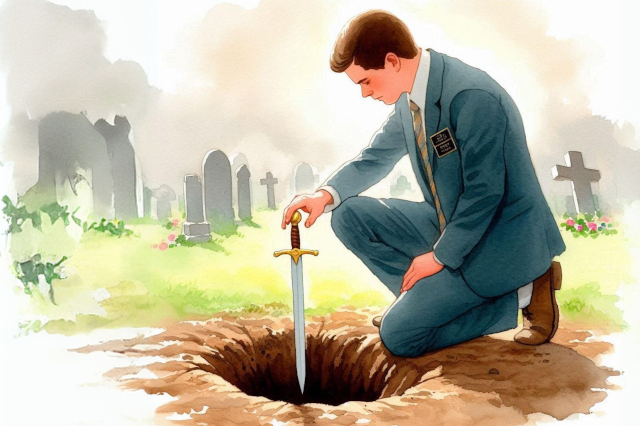
Popsicle sticks and the Atonement of Jesus Christ
Thirty minutes had passed and most of the missionaries were back in the chapel. But not my companion. Forty minutes and a few more stragglers came in. But not my companion. Fifty minutes and the APs started us singing hymns and bearing testimonies to pass the time, but my mission president and my companion were still absent. I started getting nervous. Finally, after a full hour had passed, my companion came back into the chapel alone, and our mission president hurried to the stand to continue the meeting. I didn’t ask my companion what happened; when we wrapped up the day, he told me himself. And what he said changed my understanding of the Atonement of Jesus Christ forever.
A tale of two popsicle sticks
The Fall 2010 Zone Conference for the Colorado Denver South Mission was unusual. We entered the chapel, Pres. Maynes and his wife handed each missionary a pair of popsicle sticks glued together roughly in the shape of a cross. In his training, he shared the story of King Lamoni’s father who promised to “give away all [his] sins to know [God]” (Alma 22:18). He then told of the Ammonite converts who were so zealous for the Gospel that they buried “the weapons of their rebellion” (Alma 23) as a sign of their covenant to God that they would never indulge in their violent wickedness again. And they were true to their covenant. They “never did fall away.”
Pres. Maynes then invited us to follow that same covenant pattern:
Elders and sisters, each of you has something you are holding back from the Lord— some standard, some mission rule, that you have not yet laid down. Now, I want each of you to go someplace in the building, alone, away from other missionaries— even your companion. Spend the next 30 to 45 minutes counseling with the Lord about what you are holding back— some commandment, some mission rule, whatever is the weapon of your rebellion. Write it down on the “sword” we gave you, then come back into the chapel and drop it in the plastic bag by the door. My wife and I will bury them in the backyard of the mission home as a sign of your commitment to leave that disobedience behind.
Then his voice grew uncharacteristically stern:
But do not come back into this chapel unless you are committed to truly burying that sword. If you can’t commit to giving up that sin, then please go to the Relief Society room. I will meet with you there and start the process of getting your airline ticket back home.
My companion at that time was a good guy, but also one of the least obedient missionaries in the mission, and he generally resented mission leaders’ efforts to correct him. I worried that he would choose to go home. As we all sat in the chapel waiting well past the agreed-upon time, my nervousness grew. I was relieved when he finally entered the chapel with the mission president and we resumed our training. I didn’t feel it appropriate to pry, so we went throughout our day as normal. But that evening, he told me what happened:
He knew right away what the Lord wanted him to write down on his sword—a temptation he had struggled with his entire mission. But he couldn’t put it in the bag. Pres. Maynes found him in the Relief Society room and pulled him aside for an impromptu interview. This elder explained that he wanted to give up this disobedience, he wanted to be an obedient missionary. But he knew himself. He knew that the righteous desire he felt at that moment wouldn’t be enough when push came to shove. He knew he would fail, and he felt it would be dishonest to make a commitment to God he knew he would likely break within 48 hours. Unlike the Ammonite converts, he knew he would “fall away.”
Promises I break
This resonated with me. As I shared before, as a teenager I struggled with “repentance burnout”. I remember praying my heart out, asking God’s forgiveness for arguing with my parents or slacking on homework. At first, I felt the sweet assurance of forgiveness and a desire to improve. But after a few consecutive nights of “No, I’m serious this time,” it felt like I was cheating God. I lost the fervor and soon my nightly prayers turned into this:
I know I shouldn’t have yelled at my brothers. But even though right now I feel bad about it, I don’t feel “less than the dust of the earth” (Mosiah 4) and “inexpressible horror” (Alma 36) levels of guilt. And I’ll probably cave to temptation tomorrow. So, I know this sounds awful, but I guess I’m sorry but not sorry enough. I know you can’t save me with that attitude. But it’s all I’ve got for tonight.
I looked at the rest of the Church and saw happy Saints who weren’t terrified for their salvation every moment, so I knew something about my understanding was wrong, but I couldn’t see what I was missing. How can I repent when I know I’m likely to make the same mistake again? Isn’t that lying to God? Don’t we teach that the fifth step of repentance is not doing that sin again? And what about that sobering verse in D&C 82:7, which says if we sin again after we repent, it effectively undoes our previous repentance?
When my mission companion shared this same concern with our mission president, he didn’t get a therapeutic pat on the back telling him he was “enough.” Instead, Pres. Maynes leaned in and said: “Elder, you do not understand the Atonement of Jesus Christ.”
Consider the promise we make when we are baptized as found in Mosiah 18. We promise to:
- Come into the fold of God
- Be called the people of God
- Bear one another’s burdens
- Mourn with those that mourn
- Comfort those in need of comfort
- Stand as witnesses of God at all times, in all things, and in all places all our lives
- Serve God and keep His commandments
Consider the promises we make in the Temple to follow:
- The Law of Obedience
- The Law of Sacrifice
- The Law of the Gospel
- The Law of Chastity
- The Law of Consecration
And consider the promises we make at the Sacrament table each week, to:
- Take upon us the name of God’s Son
- Always remember Him
- Keep His commandments
Then, consider that we renew all covenants (including temple covenants) and make new covenants each time we partake of the Sacrament.
It’s not an exaggeration to say that when we approach the baptismal font, the Temple, or the Sacrament table, we are promising to never sin, even though we know we will fall short of our promise, probably even before we leave the meeting. It’s quite a conundrum!
Understanding grace
If you could go back in time and offer just one brief sentence of spiritual advice to your younger self, what would it be? For me, it would be “Read ‘The Continuous Atonement’ by Brad Wilcox.” Brother Wilcox uses scripture and prophetic teaching to answer this conundrum more directly and more fully than I have ever heard it addressed elsewhere. I learned through years of struggle the principles he spells out in his book.
Yes, I need to recognize when I do wrong. But I don’t need to be filled with “inexpressible horror” by my everyday errors. I do not expect my son to weep in anguished remorse every time he grumps at his sister; why would my Father demand disproportionate drama from me? “The Lord sees weaknesses differently than He does rebellion,” and Alma the Younger levels of suffering are only required for Alma the Younger levels of sin.
Yes, the blood of Jesus Christ is a precious gift I cannot treat casually. And deliberate sin—planning to repent later—is an awful mockery of our Lord’s Atonement, and I should be highly reticent about that. But I should not be reticent or ashamed to ask the Lord to “apply” His “atoning blood” when I fall to temptation. Jesus doesn’t just offer me His grace, He “fully proffers” it to me—holding it out right in front of me, pleading for me to accept it.
When I do accept that precious gift, yes, I should reverently consider the cost: “How many drops of blood were spilled for me?” But repentance is also supposed to be a daily, joyful process! (See Pres. Nelson, Elder Renlund, and others.) When I’m sincere, I can trust that the Lord accepts my offering and proceed joyfully down the path like a little child on a trail—happy and confident, not terrified of stumbling along the way because he knows his father is there ready to catch him when he falls.
My mission president explained these principles to my companion. “Go ahead. Bury your weapon with full intent to keep it there. And when you probably cave in and dig it up, repent, and bury it again. Bury it over and over and over until eventually, you grow in the God-given fortitude to keep it buried forever.”
Hope against the daily sins
Please don’t misunderstand: I’m not recommending we be even the slightest bit cavalier about our covenants. “God will not be mocked.” Some weapons of rebellion must be buried so deep that you involve priesthood holders to help dig the hole and seal it so you never, ever take them up again. That’s not what I’m talking about here. I’m talking about the “thorns of the flesh” that afflict striving Saints day after day and make even prophets cry out in frustration, “O wretched man that I am! … My soul grieveth because of mine iniquities. I am encompassed about, because of the temptations and the sins which do so easily beset me!” (2 Nephi 4). Like the Psalmist Nephi, we too can take comfort that “because that [our] heart is broken and [our] spirit is contrite,” we can trust in the Lord to “redeem [our] soul” and, over time, change our hearts so completely that we will “shake at the appearance of sin” that once plagued us daily.
To quote my favorite talk:
Acknowledge and face your weaknesses, but don’t be immobilized by them, because some of them will be your companions until you depart this earth life. No matter what your current status, the very moment you voluntarily choose honest, joyful, daily repentance by striving to simply do and be your very best, the Savior’s Atonement envelops and follows you, as it were, wherever you go. Living in this manner, you can truly “always retain a remission of your sins” (Mosiah 4:12) every hour of every day, every second of every minute, and thus be fully clean and acceptable before God all the time.
Yours is the privilege, if you want it, to come to know for yourself, today or soon, that you are pleasing God in spite of your shortcomings.


